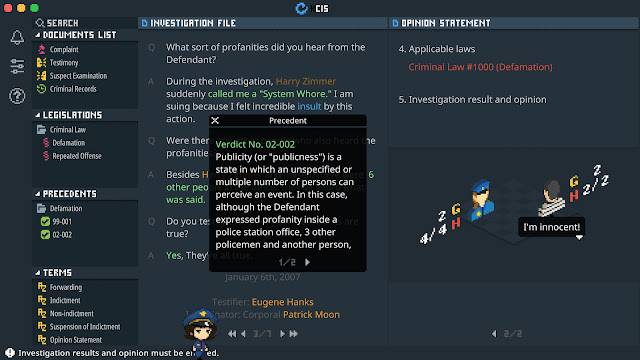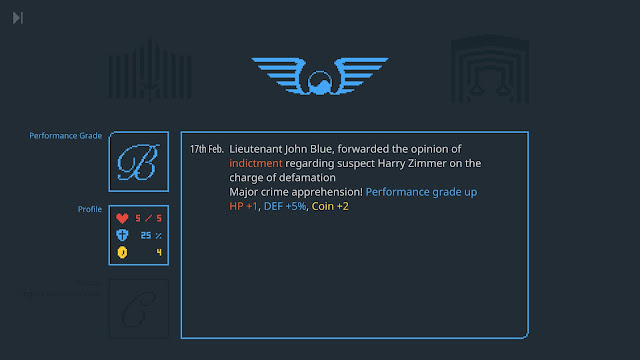Legal Dungeon is a fascinating little game, and something entirely unique. We don’t often get to say this these days, but you really haven’t played anything like this before. That comes with some issues that hamper the overall experience, but nonetheless I doubt I’m going to forget this experience in a hurry.
In Legal Dungeon, you’ve a cop, and you’ve got the job of figuring out, based on a series of testimonies, reports, and other pieces of evidence, whether there’s means and cause to indict someone for a crime. What that means in practice is that you read through dozens of “pages” of investigation reports, and then fill out various pieces of critical information. It’s the work that happens after the event that most crime-focused video games depict, in other words. It’s the boring bit. Someone decided to turn the boring bit into a game and the results are… much more entertaining than the premise might suggest.
The investigation reports are littered with keywords, so the trick here is to drag-and-drop the right piece of information on to the document when asked to provide it to complete your report. Once the report itself has been finalised, the next task is to engage in a “showdown” with the suspect. This works like a Q & A, where the suspect asks you to “prove” something, and then you need to flick through precedents and legal definitions to prove whether their statements – or the statements of those around them – are enough to indict and not. It’s presented like in an RPG battle – get the right result and you do “damage” to the suspect. Throw the wrong precedent in the argument and you’ll take damage in return. Interestingly there will also be times that you may need to “prove” that an indictment isn’t possible and you’re effectively trying to defend the suspect then. If you do your job well then the conviction occurs (or doesn’t), and you get rewarded. If you perform poorly the case will go the other way and you’re in for a reprimand.
The game also has a clear focus on hierarchy. You don’t see portraits of the various characters. Rather, when they’re talking, their rank shows up on the screen. Korea is a hierarchical society, and this game treats that as an issue as far as bureaucracy is concerned, reducing the members of the police to nothing more than ambitious low-ranking officers and tired high-ranking bureaucrats. You wouldn’t necessarily call Legal Dungeon an “ACAB” argument, or an argument for defunding the police, but it’s also clearly uninterested in the fantasy about the police forces and legal system being something to lionise. It’s really quite critical of the system and the way it drives even the noblest towards corrupt ends.
For a game that needs to throw a lot of text at you, the visual design is a nice, low-fi recreation of a desktop OS. What I really liked, however, is how all the cases are, apparently, based on real-world case-work in Korea, which is more presentational than a narrative necessity, but it adds to the authenticity of the experience. Keywords are clearly highlighted in various colours (depending on their application), so it’s possible to see, at a glance, what you can and cannot do. The interface is the game’s most key aesthetic component, and if the developer didn’t get it this right, the game would have been a nightmare to play. With that being said, it was clearly a game built for a mouse, and trying to flip through pages by using the control stick on the Switch to click on an arrow a couple pixels in size is tiring.
You do have to reward creativity, and Legal Dungeon is genuinely creative. This is not a job or process that you would have ever imagined could be gamified, but there you have it. It tells a fascinating story, especially as an outsider to the Korean legal system, and while it’s not a particularly comfortable experience on the Nintendo Switch, and perhaps a little imprecise for a puzzle game, it is very difficult to put down.
– Matt S.
Editor-in-Chief
Find me on Twitter: @mattsainsb










